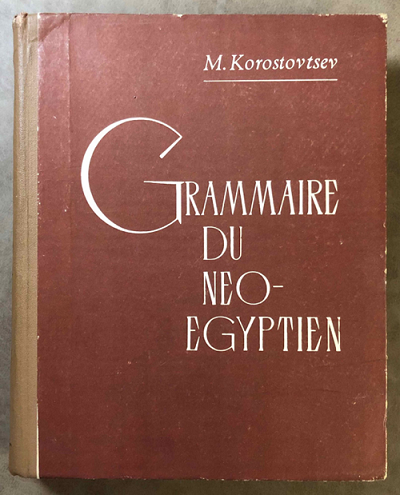The College is delighted to have recently acquired a rare copy of Mikhail Korostovtsev’s Grammaire du néo-égyptien, signed by the author himself. Mikhail Korostovtsev was one of the most consequential Egyptologists of the twentieth century, best known today for his pioneering edition of the Voyage of Wenamun, now widely considered the standout composition of the Late Egyptian literary tradition. The story provides a remarkable insight into political and logistical challenges faced by traders in the eastern Mediterranean in the late second millennium BCE, as told by an accident-prone cedar merchant. The narrative is characterised by techniques unusual for such an early period, including satire and intercultural allusions that reflect Egypt’s relationships with its neighbours.

Korostovtsev’s work on Wenamun was, however, but a small part of a much larger career that saw him publish over 200 academic works in Russian, English, French and German. This impressive feat is all the more remarkable considering his life story. Born in 1900 in the small village of Popovka in what is now eastern Ukraine, Korostovtsev had a difficult start to his research career. Already keenly interested in Egypt as a teenager, he was initially unable to follow his dreams due to the Russian Civil War and conscription into the Red Army. Struggling to make ends meet, he then enlisted in the Navy, but eventually enrolled as a history student in Azerbaijan State University, Baku. In 1935, Korostovtsev finally secured a junior research position in the Soviet Academy of Sciences in Moscow, where he earned his doctorate in 1943 at the height of World War II. The following year, he became the first Soviet Egyptologist to work in Egypt and forged valuable contacts with a range of French and British academics, many of which he retained for the rest of his life. Unfortunately, this international outlook also brought the attention of the Soviet security services, who arrested Korostovtsev on treason charges in 1948. He spent the next seven years in a Soviet labour camp.
Following Stalin’s death, Korostovtsev was exonerated and rapidly recognised as the USSR’s preeminent Egyptologist. He was quickly promoted Full Professor in Moscow, and made an Academician shortly after. This new-found state backing allowed him to resume engagement with international audiences, including writing the French-language Grammaire du néo-égyptien. Korostovtsev hoped that publishing a comprehensive pedagogical work in one of the major international languages of Egyptology would help to consolidate the USSR’s status as one of the leading countries in the discipline. While subsequent political developments after his lifetime meant that this ambition has not yet been fully achieved, the Grammaire remains a powerful testimony to the importance of breaking down geopolitical barriers in a scholarly setting. It is also a well-structured and user-friendly grammar in its own right, which will surely be of interest to any Christ’s students taking Late Egyptian as part of their Archaeology degree.
Written by Dr Alexandre Loktionov, College Access Bye-Fellow, Former Wallis Budge Junior Research Fellow, and co-ordinator of Christ’s College Egyptology website.
